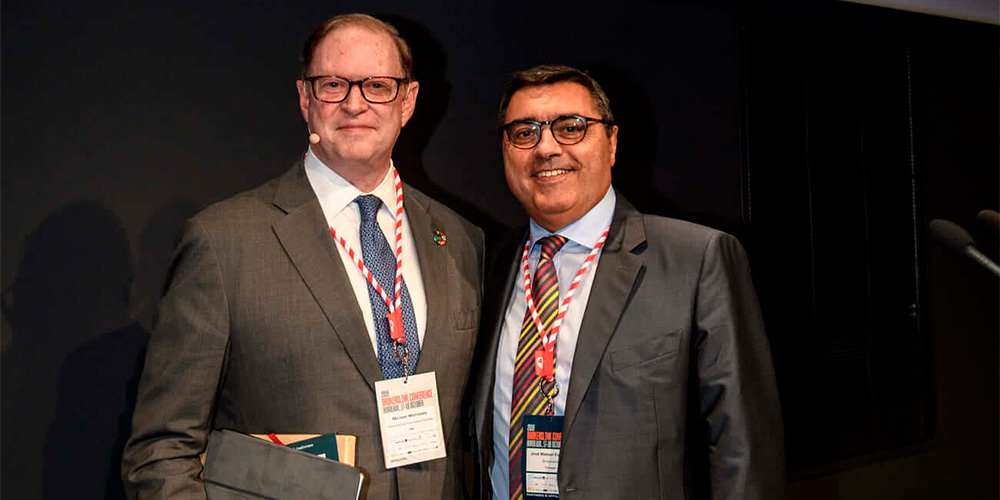The insurance industry must change, of that there is no doubt. An industry that hasn’t been fundamentally altered in the last 400 years can’t hope to meet the demands of a world that is changing at breakneck speed. But acceptance of that fact and effecting the necessary change are two very different things and in an industry whose participants are not known for their collaborative instincts, it starts to look like an intractable problem.
IIS – the mission
However, there is hope for broad, meaningful change in the form of the International Insurance Society (IIS). Formed in 1965, the IIS has taken on the responsibility of creating greater collaboration in the industry to understand the challenges it faces and plot paths towards establishing a new role in society.
With representatives from 90 countries, its membership is drawn from private and public stakeholders including senior insurance executives, international regulatory authorities and prominent insurance scholars to promote resilience, drive innovation, and stimulate the development of markets.
But it is not an organisation set up to help members sell more insurance. It takes a much more intellectual, thoughtful approach in seeking to understand the relevance and purpose of insurance today and tomorrow.
"It’s not an advocacy or lobbying organisation – it’s an organisation that believes that by having all stakeholders in the industry participating, the exchange of ideas produces better ideas.", says IIS CEO Mike Morrissey.
He paints a picture of a diverse and inclusive organisation that seeks to improve the industry through the input of all parties involved in the insurance value chain from insurers and brokers to public policy organisations and global institutions such as the United Nations and World Bank.
This broad‑church approach gives Morrissey and his colleagues a 360 view, not only of the industry, but of the economies and societies it serves. And he believes that the industry needs this view more than ever as the unprecedented speed and nature of disruption in society is going to fundamentally change the way customers perceive, engage with and utilise insurance.
Brave new world
“The speed of change in our world does make it more disruptive than anything that has gone before it,” he says.
He points to technological disruption like the internet of things, economic disruption led by the sharing economy and online commerce, social disruption and the aging of first world populations and climate change as the key challenges.
“In light of these, I see five major trends that I think will most dramatically impact the insurance industry over the short and medium term.”
He believes that there will be increased use of automation, AI and robotics in underwriting pricing and claims and that more and more commercial business will be sold in an online, comparative way, much like motor insurance is.
He also predicts that the recent trend of consolidation in the broker market will continue and that changes in population dynamics and the economy will drive consumer demand for omni‑channel sales and servicing capability.
But more than anything, he sees a race for human resource as a major characteristic of the future industry. “The supply and demand imbalance for skilled employees will create a huge battle for talent,” he says.
"I already see companies investing in technology to maximise employee value, provide continuous learning and minimise the impact of skill shortages. And I would add that the industry needs to build a workforce that reflects the increasing diversity of our global society. Only a workforce that is diverse and inclusive can understand and anticipate coverage needs, appropriate distribution approaches and deliver a 21st century customer experience."
Brokers play not only a critical role in delivering Insurance 4.0 but are probably in the best position to do so.
Insurance 4.0
This approach, he believes, allows the industry to respond effectively to the
Fourth Industrial Revolution, a term coined by Professor Klaus Schwab, Founder and Executive Chairman of the World Economic Forum.
In short, the Fourth Industrial Revolution, according to Schwab, is “characterised by a range of new technologies that are fusing the physical, digital and biological worlds, impacting all disciplines, economies and industries, and even challenging ideas about what it means to be human.”
Morrissey believes that a move towards what he calls Insurance 4.0 is vital if the industry is to remain relevant in this new, digitally‑enhanced world of increased risk and opportunity.
According to Morrissey, Insurance 4.0 goes far beyond new products, new risks and new ways of getting insurance to customers. It is a completely new conception of what insurance can be and do for society.
"Insurance companies have historically wanted to sell protection to compensate people for losses after they occur, and I think in the world of Insurance 4.0, customers, large and small, commercial and personal, increasingly want to buy loss mitigation and loss prevention, via advisory services.", he believes.
Broking is key
“Risk management advice has become the key and brokers are in the best position in this respect because they are able to find the best price, the best products to fit individual customer needs and harness the expertise of a wide range of insurance companies and insurance service organisations for the benefit of the client,” he says.
“Brokers play not only a critical role in delivering Insurance 4.0 but are probably in the best position to do so.”
He does, however, caveat that not all brokers are in a position or have the ability to deliver this kind of service. Indeed, he believes that models such as the one employed by Brokerslink offer the greatest chance for the industry to reach Insurance 4.0.
“It fills a very urgent and important need because the industry is all about ecosystems now rather than just vertically integrated systems, an ecosystem of different organisations with different capabilities” he says.
“To have an organisation like Brokerslink where you have independent, specialist risk management advice with an embedded local knowledge, supported by a global technology and administration platform, is a great competitive advantage.
“Because not all, but some, of the very large brokers have, in the interests of efficiency, built a somewhat homogenised global system,” he adds.
He compares this homogenised system to buying fries at McDonald’s – they may not be the best, but they are going to be the same anywhere you go in the world. Although he says it is a bad analogy, he believes that some of the services offered by at least some of the major global brokers have gone down that homogenised route. And while clients may be able to reply on the same products and services globally, they may not be the most appropriate for the client.
“I think that by having many local and specialised affiliates, Brokerslink provides more tailored services. That is a very good thing,” he says.
Challenges vs opportunities
But beyond this, Morrissey sees even greater opportunity for the industry – both in commercial terms and in its ability to support society – when it looks beyond its traditional commercial borders.
The Insurance Development Forum (IDF), set up by the IIS on behalf of the insurance industry with leaders of the United Nations, the World Bank in 2016, is a public/ private partnership which seeks to tackle the challenges posed by extreme weather and the protection gap, and explores the role of insurance in creating greater global resilience and sustainability. And it is in through this organisation, of which the IIS is the Secretariat, that Morrissey sees the greatest opportunity for the insurance industry.
“Governments are the insurers of last resort, and when they are forced to pick up the pieces after a natural disaster, the only way they can pay for it is to raise taxes or reduce services to citizens,” he says.
“So, they are increasingly buying insurance, which is a great opportunity for our industry. And of course, more businesses and more families get covered through the public/private partnership initiatives like micro insurance.”
He says that through the IDF and other global initiatives, a new, more collaborative approach is emerging within the industry: “Insurance companies are not just fighting with each other over a share of the pie. The pie is getting bigger, the market is getting bigger.” And he is full of enthusiasm for the future of an industry that is at the early stages of carving out a more meaningful role in society at both a local and global level.
“Having been in the industry for 50 years now, there has never been a time of more exciting, new opportunities,” he says.
"There are challenges for sure, but there has never been a time of so many opportunities for our industry to both prosper and to make a beneficial impact on society than right now. It is a great time for our business to show what a noble service it provides to our world."

